八年级下>Module 3 On the radio>本模块综合与测试
文档属性
| 名称 | 八年级下>Module 3 On the radio>本模块综合与测试 | 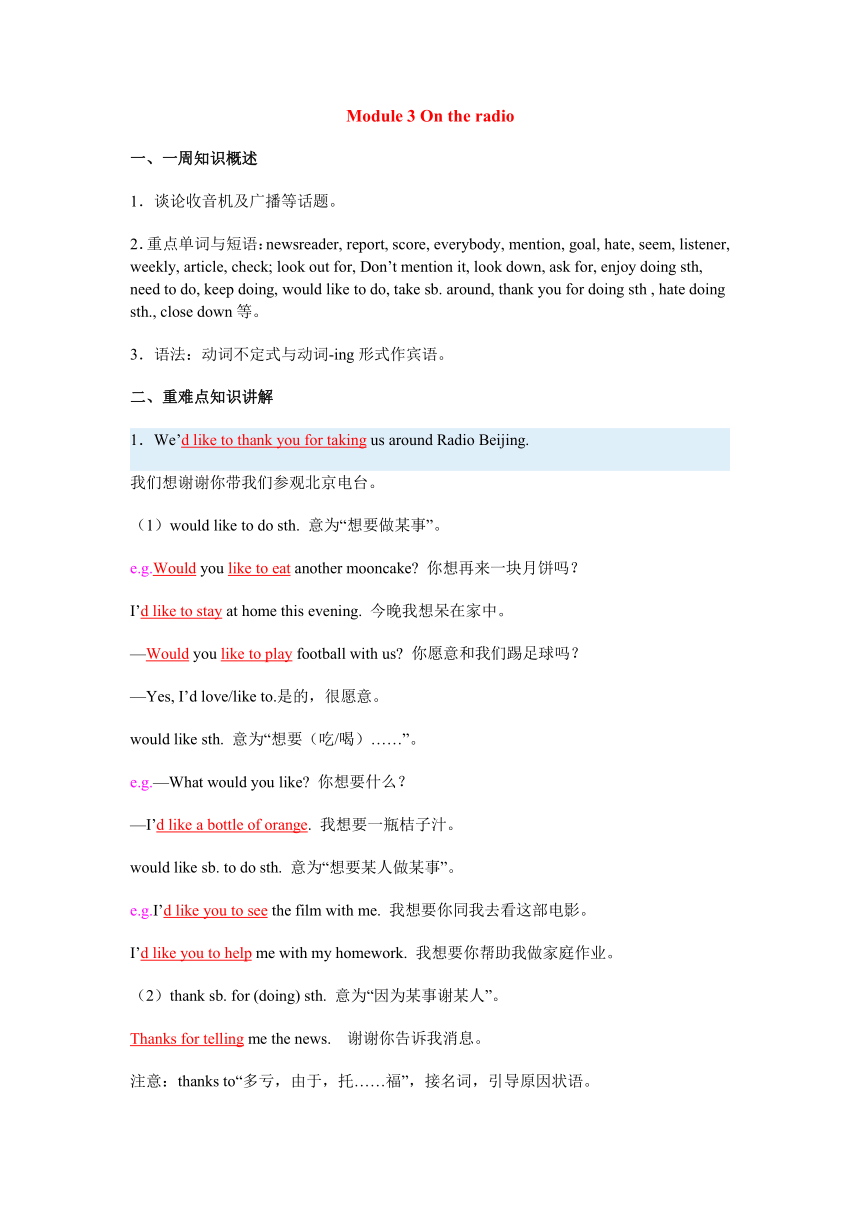 | |
| 格式 | zip | ||
| 文件大小 | 24.3KB | ||
| 资源类型 | 教案 | ||
| 版本资源 | 外研版 | ||
| 科目 | 英语 | ||
| 更新时间 | 2013-05-21 08:09:19 | ||
图片预览

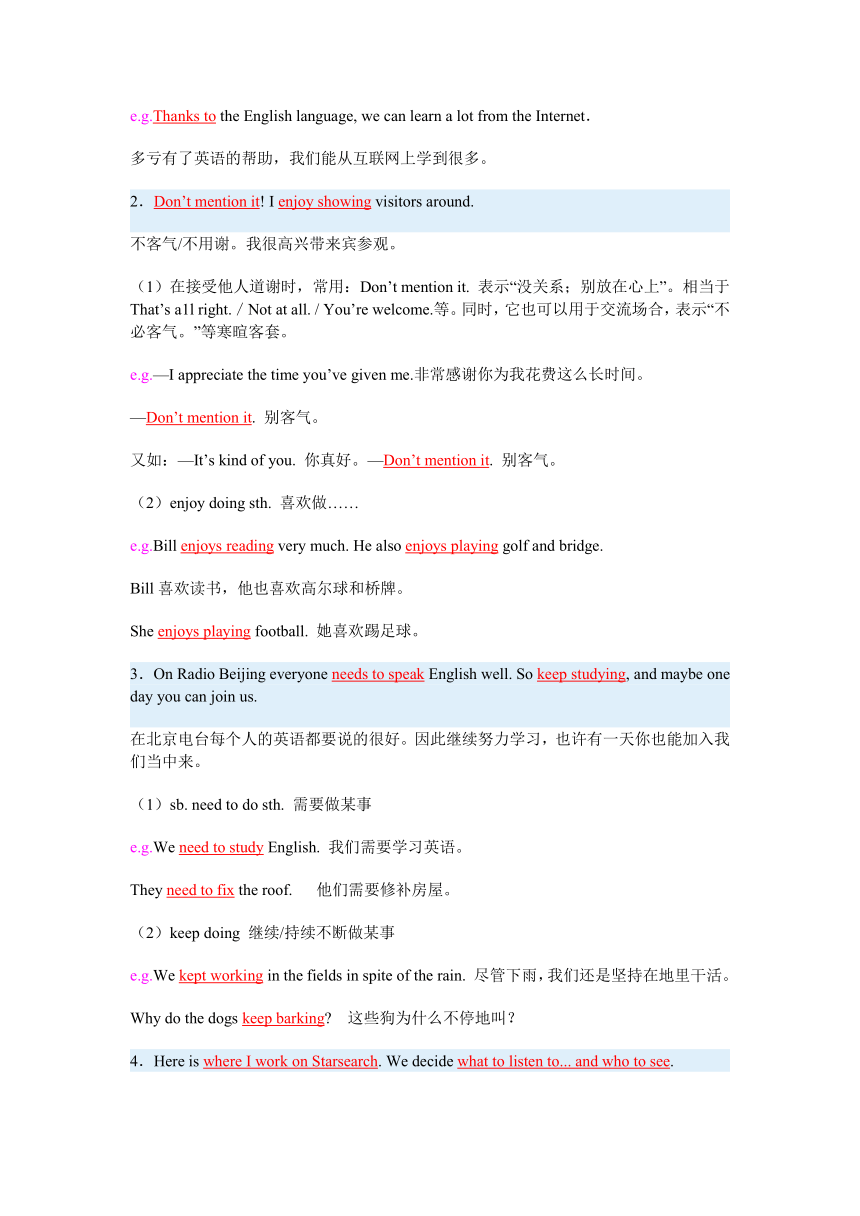
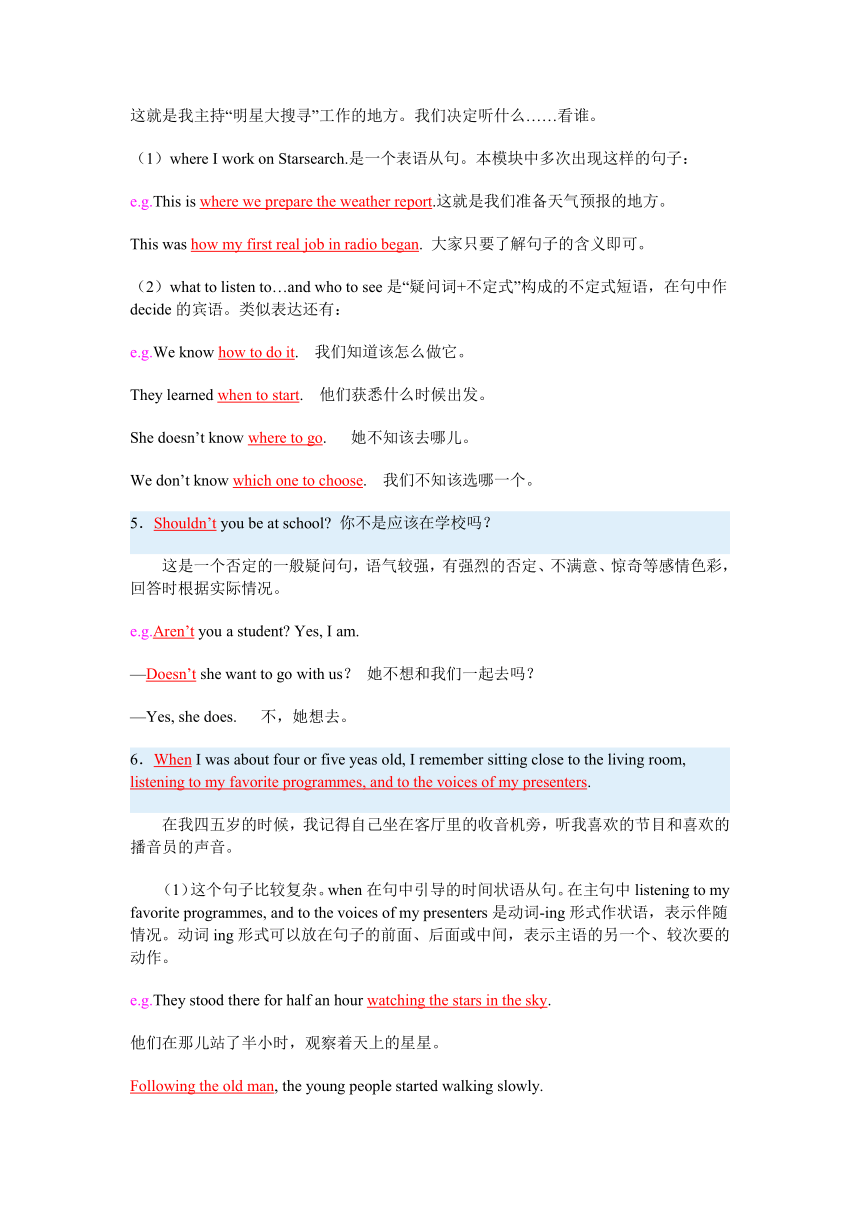
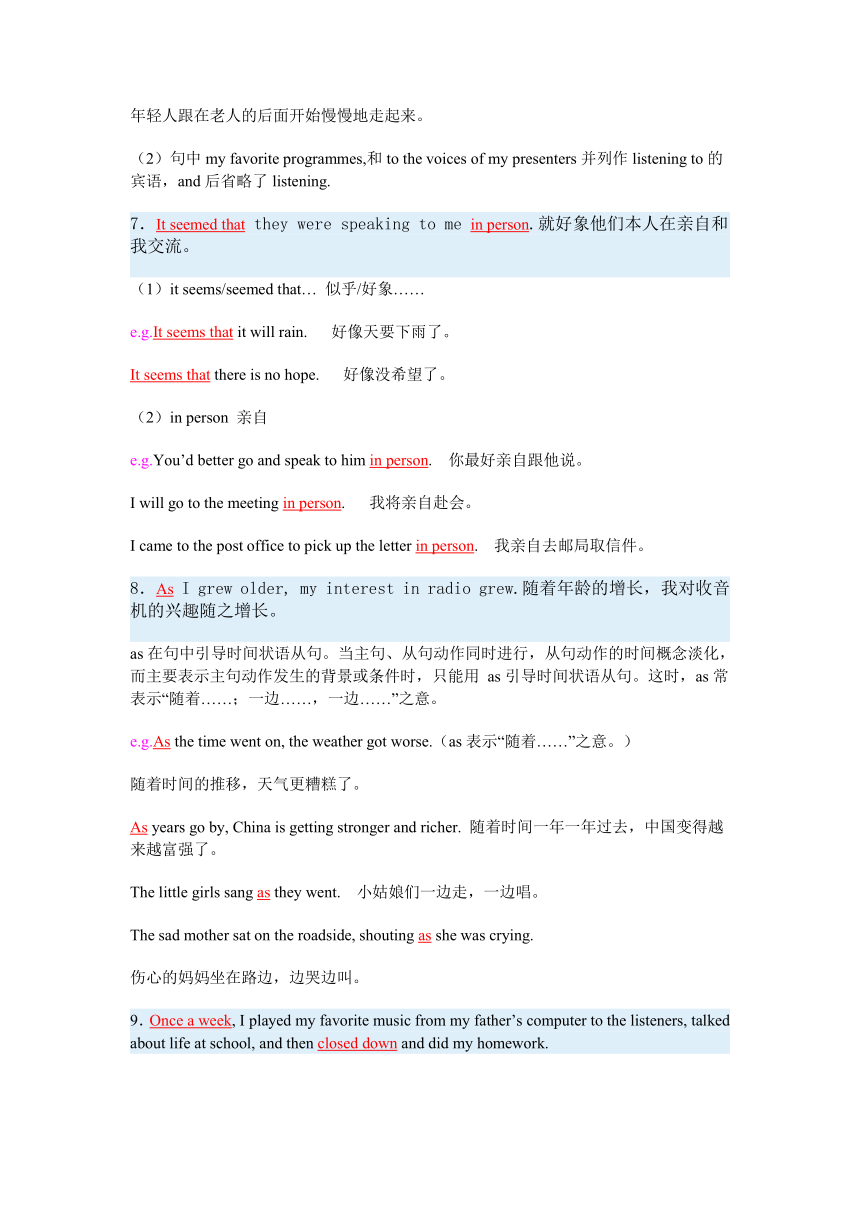
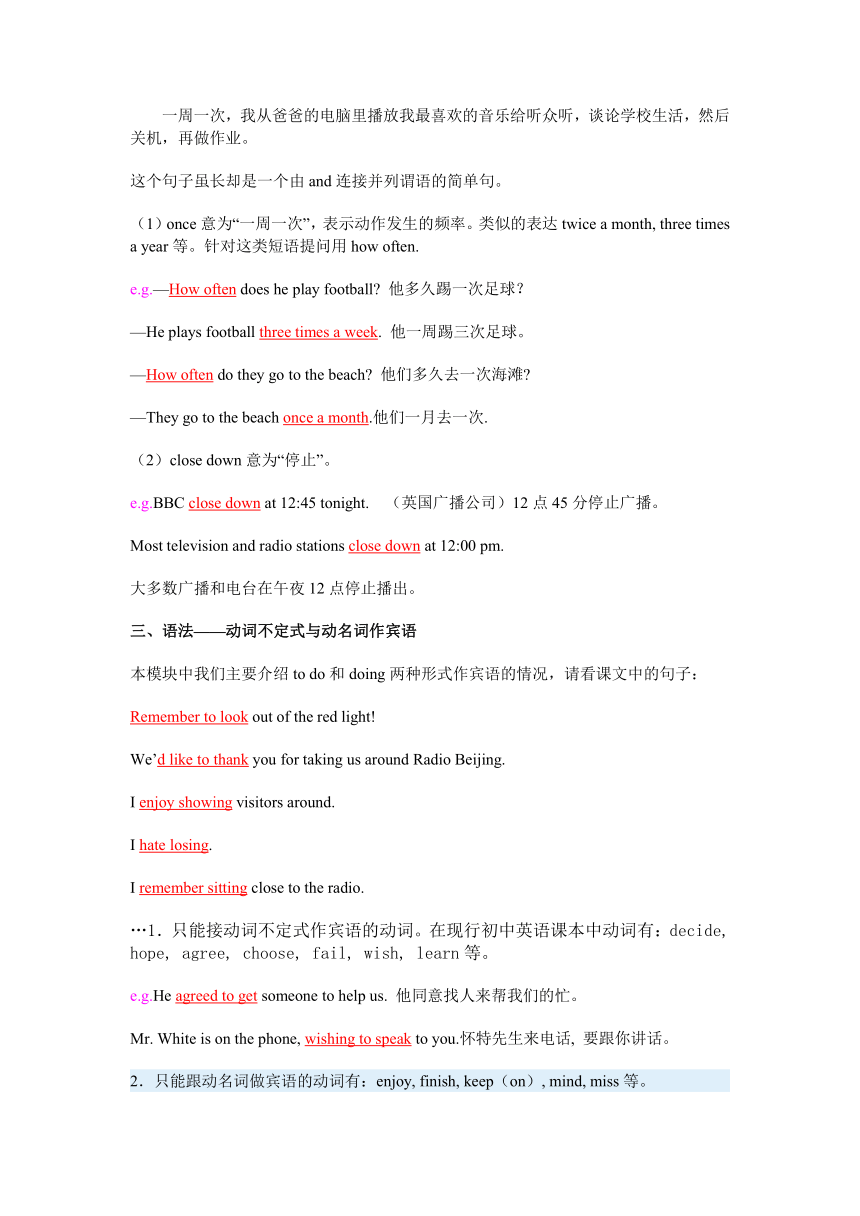
文档简介
Module 3 On the radio
一、一周知识概述
1.谈论收音机及广播等话题。
2.重点单词与短语:newsreader, report, score, everybody, mention, goal, hate, seem, listener, weekly, article, check; look out for, Don’t mention it, look down, ask for, enjoy doing sth, need to do, keep doing, would like to do, take sb. around, thank you for doing sth , hate doing sth., close down等。
3.语法:动词不定式与动词-ing形式作宾语。
二、重难点知识讲解
1.We’d like to thank you for taking us around Radio Beijing.
我们想谢谢你带我们参观北京电台。
(1)would like to do sth. 意为“想要做某事”。
e.g.Would you like to eat another mooncake 你想再来一块月饼吗?
I’d like to stay at home this evening. 今晚我想呆在家中。
—Would you like to play football with us 你愿意和我们踢足球吗?
—Yes, I’d love/like to.是的,很愿意。
would like sth. 意为“想要(吃/喝)……”。
e.g.—What would you like 你想要什么?
—I’d like a bottle of orange. 我想要一瓶桔子汁。
would like sb. to do sth. 意为“想要某人做某事”。
e.g.I’d like you to see the film with me. 我想要你同我去看这部电影。
I’d like you to help me with my homework. 我想要你帮助我做家庭作业。
(2)thank sb. for (doing) sth. 意为“因为某事谢某人”。
Thanks for telling me the news. 谢谢你告诉我消息。
注意:thanks to“多亏,由于,托……福”,接名词,引导原因状语。
e.g.Thanks to the English language, we can learn a lot from the Internet.
多亏有了英语的帮助,我们能从互联网上学到很多。
2.Don’t mention it! I enjoy showing visitors around.
不客气/不用谢。我很高兴带来宾参观。
(1)在接受他人道谢时,常用:Don’t mention it. 表示“没关系;别放在心上”。相当于That’s a1l right./Not at all. / You’re welcome.等。同时,它也可以用于交流场合,表示“不必客气。”等寒暄客套。
e.g.—I appreciate the time you’ve given me.非常感谢你为我花费这么长时间。
—Don’t mention it. 别客气。
又如:—It’s kind of you. 你真好。—Don’t mention it. 别客气。
(2)enjoy doing sth. 喜欢做……
e.g.Bill enjoys reading very much. He also enjoys playing golf and bridge.
Bill喜欢读书,他也喜欢高尔球和桥牌。
She enjoys playing football. 她喜欢踢足球。
3.On Radio Beijing everyone needs to speak English well. So keep studying, and maybe one day you can join us.
在北京电台每个人的英语都要说的很好。因此继续努力学习,也许有一天你也能加入我们当中来。
(1)sb. need to do sth. 需要做某事
e.g.We need to study English. 我们需要学习英语。
They need to fix the roof. 他们需要修补房屋。
(2)keep doing 继续/持续不断做某事
e.g.We kept working in the fields in spite of the rain. 尽管下雨,我们还是坚持在地里干活。
Why do the dogs keep barking 这些狗为什么不停地叫?
4.Here is where I work on Starsearch. We decide what to listen to... and who to see.
这就是我主持“明星大搜寻”工作的地方。我们决定听什么……看谁。
(1)where I work on Starsearch.是一个表语从句。本模块中多次出现这样的句子:
e.g.This is where we prepare the weather report.这就是我们准备天气预报的地方。
This was how my first real job in radio began. 大家只要了解句子的含义即可。
(2)what to listen to…and who to see是“疑问词+不定式”构成的不定式短语,在句中作decide的宾语。类似表达还有:
e.g.We know how to do it. 我们知道该怎么做它。
They learned when to start. 他们获悉什么时候出发。
She doesn’t know where to go. 她不知该去哪儿。
We don’t know which one to choose. 我们不知该选哪一个。
5.Shouldn’t you be at school 你不是应该在学校吗?
这是一个否定的一般疑问句,语气较强,有强烈的否定、不满意、惊奇等感彩,回答时根据实际情况。
e.g.Aren’t you a student Yes, I am.
—Doesn’t she want to go with us? 她不想和我们一起去吗?
—Yes, she does. 不,她想去。
6.When I was about four or five yeas old, I remember sitting close to the living room, listening to my favorite programmes, and to the voices of my presenters.
在我四五岁的时候,我记得自己坐在客厅里的收音机旁,听我喜欢的节目和喜欢的播音员的声音。
(1)这个句子比较复杂。when在句中引导的时间状语从句。在主句中listening to my favorite programmes, and to the voices of my presenters是动词-ing形式作状语,表示伴随情况。动词ing形式可以放在句子的前面、后面或中间,表示主语的另一个、较次要的动作。
e.g.They stood there for half an hour watching the stars in the sky.
他们在那儿站了半小时,观察着天上的星星。
Following the old man, the young people started walking slowly.
年轻人跟在老人的后面开始慢慢地走起来。
(2)句中my favorite programmes,和to the voices of my presenters并列作listening to的宾语,and后省略了listening.
7.It seemed that they were speaking to me in person.就好象他们本人在亲自和我交流。
(1)it seems/seemed that… 似乎/好象……
e.g.It seems that it will rain. 好像天要下雨了。
It seems that there is no hope. 好像没希望了。
(2)in person 亲自
e.g.You’d better go and speak to him in person. 你最好亲自跟他说。
I will go to the meeting in person. 我将亲自赴会。
I came to the post office to pick up the letter in person. 我亲自去邮局取信件。
8.As I grew older, my interest in radio grew.随着年龄的增长,我对收音机的兴趣随之增长。
as在句中引导时间状语从句。当主句、从句动作同时进行,从句动作的时间概念淡化,而主要表示主句动作发生的背景或条件时,只能用 as引导时间状语从句。这时,as常表示“随着……;一边……,一边……”之意。
e.g.As the time went on, the weather got worse.(as表示“随着……”之意。)
随着时间的推移,天气更糟糕了。
As years go by, China is getting stronger and richer. 随着时间一年一年过去,中国变得越来越富强了。
The little girls sang as they went. 小姑娘们一边走,一边唱。
The sad mother sat on the roadside, shouting as she was crying.
伤心的妈妈坐在路边,边哭边叫。
9.Once a week, I played my favorite music from my father’s computer to the listeners, talked about life at school, and then closed down and did my homework.
一周一次,我从爸爸的电脑里播放我最喜欢的音乐给听众听,谈论学校生活,然后关机,再做作业。
这个句子虽长却是一个由and连接并列谓语的简单句。
(1)once意为“一周一次”,表示动作发生的频率。类似的表达twice a month, three times a year等。针对这类短语提问用how often.
e.g.—How often does he play football 他多久踢一次足球?
—He plays football three times a week. 他一周踢三次足球。
—How often do they go to the beach 他们多久去一次海滩
—They go to the beach once a month.他们一月去一次.
(2)close down意为“停止”。
e.g.BBC close down at 12:45 tonight. (英国广播公司)12点45分停止广播。
Most television and radio stations close down at 12:00 pm.
大多数广播和电台在午夜12点停止播出。
三、语法——动词不定式与动名词作宾语
本模块中我们主要介绍to do和doing两种形式作宾语的情况,请看课文中的句子:
Remember to look out of the red light!
We’d like to thank you for taking us around Radio Beijing.
I enjoy showing visitors around.
I hate losing.
I remember sitting close to the radio.
…1.只能接动词不定式作宾语的动词。在现行初中英语课本中动词有:decide, hope, agree, choose, fail, wish, learn等。
e.g.He agreed to get someone to help us. 他同意找人来帮我们的忙。
Mr. White is on the phone, wishing to speak to you.怀特先生来电话, 要跟你讲话。
2.只能跟动名词做宾语的动词有:enjoy, finish, keep(on), mind, miss等。
e.g.He enjoys listening to the radio. 他喜欢听收音机。
I have learned 200 Chinese words, but I keep forgetting some of them.
我已经学了200多个汉字,但有些总是记不住。
—Do you mind my opening the window?我打开窗户你不介意吧?
—No, not at all. 不介意。
3.既能跟动词不定式也能跟动名词形式作宾语的动词有:like, love, begin , start, hate。
e.g.Tomorrow I start to work(working). 明天我开始工作。
Do you like to play(playing) football?你爱踢足球吗?
但在下面情况下一般用动词不定式作宾语:
①would like /love后,表示特定动作时。
e.g.Would you like to leave a message? 你要不要留个话儿?
②当谓语已经用了进行时态时。
e.g.It’s beginning to rain. 天开始下雨了。
③在begin后非限定动词由某些状态动词构成时。
e.g.We began to think of this question. 我们开始考虑这个问题。
She began to believe his story. 她开始相信他的故事。
4.动名词和动词不定式作宾语时意思不同的动词。
①need,want跟动名词形式作宾语时表示被动意义,跟动词不定式作宾语时表示主动意义。试比较下面的句子:
e.g.These trees need watering(to be watered). 这些树需要浇水。
We need to go there. 我们需要到那儿去。
Your hair needs cutting(to be cut). 你的头发需要理了。
I want to see him. 我想去看望他。
注意:need既可以作行为动词,也可以作情态动词。试比较下面句子:
You need to be here early. 你需要早一点到这儿。(need作行为动词)
Need you go so soon? 你需要这么早走吗?(need作情态动词)
②remember, forget, stop, go on等动词后跟动名词作宾语时,表示动名词的动作发生在谓语动词动作之前;跟动词不定式作宾语时,表示动词不定式的动作发生在谓语动词动作之后。试比较下面的句子:
I remember telling you about it once. 这事我记得曾和你谈过一次。
You must remember to write to us when you get there.到那里时,千万别忘了给我们写信。
Go on reading the text. 继续读课文。
After he finished the composition, he went on to do his homework. 他写完作文后接着做作业。
She stopped speaking. 她停止讲话。
He stopped to speak to Martin. 他停下来和马丁说话。(动词不定式to speak在句中作状语)
③try和mean跟动名词和动词不定式作宾语时,在意思上差别很大。
a.try跟动名词作宾语时是“试着做某事”的意思;而跟动词不定式作宾语时是“设法做某事”的意思。试比较下面句子:
She tried writing a composition. 她试着写作文。
She tried to get you on the phone. 她设法打电话找你。
b.mean 跟动名词作宾语时是“意思是、意味着”的意思;而跟动词不定式时是“企图、打算”的意思。试比较下面句子:
This means wasting much money. 这意味着浪费很多钱。
I meant to call on you. But I was so busy. 我是想来看望你的,但我太忙了。
窗体顶端
单项选择:
1.I like __________ very much, but I don’t like _________ this morning.
A.swimming, swimming B.to swim, to swim
C.swimming, to swim D.to swim, swimming
2.Little Jim would love __________ to the theatre this evening.
A.to be taken B.to takeC.being taken D.taking
3.—Did you close the door —Yes, I remember __________ it.
A.to close B.to closingC.closing D.closed
4.Missing the train means __________ for an hour.
A.to wait B.to be waitedC.being waited D.waiting
5.Would you ___________ me your pictures, Mary
A.mind to show B.mind showing
C.trouble to show D.trouble showing
6.The teacher told the students to stop __________ to him.
A.to write and listen B.writing and listening
C.to write and listening D.writing and to listen
7.He finished his homework, then he went on __________ a letter.
A.write B.writingC.with D.to write
8.The grass has grown so tall that it needs _________.
A.to cut B.to be cut itC.cutting D.being cut
9.You didn’t need __________ him the news; it just made him sad.
A.telling B.tellC.to tell D.that you would tell
10.Most of the children enjoy ________ computer games.
A.play B.playingC.played D.to play
11.—Thank you very much ______ helping me to repair my old computer.
—That’s all right. Thanks ______ your letter, I can come in time and repair it for you.
A.for, for B.to, toC.to, for D.for, to
12.—Would you like ________ a cup of coffee —Yes, please.
A.having B.to have C.have D.had
13.—I’m glad to meet you. —________.
A.Great B.ThanksC.Of course D.Me, too
14.—Thanks for your help. —_______.
A. That’s right B.It’s right
C.That’s all right D.You are right
15.________ did you have for lunch yesterday?
A.When B.WhereC.What D.How
窗体底端
一、根据首字母或汉语提示完成单词。
1.Remember to l out for the red light!
2.My g (目标) in life is to help others.
3.The newsreader is r the news.
4.Can you e (解释) why you were late
5.It s (似乎) that there is something funny about the case.
6.This w is printed every Friday.
7.Most television and radio stations c down at 12:00 pm.
8.Your idea s a good one.
二、翻译下列短语。
1.最新消息 2.想要做……
3.带某人参观 4.当心
5.停止做某事 6.需要做某事
7.继续/持续做某事 8.停止播音
9.早餐吃…… 10.高兴做某事
11.准备…… 12.在……岁
三、用动词的适当形式填空。
1.I’d love __________ (see) that film.
2.What do you like _______(do)
3.He doesn’t like ______(watch) TV.
4.Harris began _______(work) when he saw the boss _____ (come).
5.Tom’s mother wants him ________ (go) to school by bus.
6.Can you help me________ (clean) the house
7.The Clark family enjoy ________(travel)very much.
8.Mary will try ________ (finish) her homework before 10 o’clock.
9.I’m still looking for a job but I hope __________ (find) something soon.
10.Don’t you think he is running too fast Tell him _________ (run) more slowly
答案:1-5 CACDB 6-10 DDCCB 11-15 DBDCC
答案:1.look 2.Goal 3.report 4.explain
5.seems 6.Weekly 7.close 8.sounds
答案:
1.the latest news 2.would like to do sth. 3.show sb. around
4.loot out (for) 5.stop doing sth. 6.need to do sth.
7.keep doing sth. 8.close down 9.have …for breakfast
10.be happy to do sth. 11.prepare for… 12.at the age of…
答案:
1.to see 2.to do
3.watching 4.to work, coming
5.to go 6.(to) clean
7.traveling 8.to finish
9.to find 10.to run
一、一周知识概述
1.谈论收音机及广播等话题。
2.重点单词与短语:newsreader, report, score, everybody, mention, goal, hate, seem, listener, weekly, article, check; look out for, Don’t mention it, look down, ask for, enjoy doing sth, need to do, keep doing, would like to do, take sb. around, thank you for doing sth , hate doing sth., close down等。
3.语法:动词不定式与动词-ing形式作宾语。
二、重难点知识讲解
1.We’d like to thank you for taking us around Radio Beijing.
我们想谢谢你带我们参观北京电台。
(1)would like to do sth. 意为“想要做某事”。
e.g.Would you like to eat another mooncake 你想再来一块月饼吗?
I’d like to stay at home this evening. 今晚我想呆在家中。
—Would you like to play football with us 你愿意和我们踢足球吗?
—Yes, I’d love/like to.是的,很愿意。
would like sth. 意为“想要(吃/喝)……”。
e.g.—What would you like 你想要什么?
—I’d like a bottle of orange. 我想要一瓶桔子汁。
would like sb. to do sth. 意为“想要某人做某事”。
e.g.I’d like you to see the film with me. 我想要你同我去看这部电影。
I’d like you to help me with my homework. 我想要你帮助我做家庭作业。
(2)thank sb. for (doing) sth. 意为“因为某事谢某人”。
Thanks for telling me the news. 谢谢你告诉我消息。
注意:thanks to“多亏,由于,托……福”,接名词,引导原因状语。
e.g.Thanks to the English language, we can learn a lot from the Internet.
多亏有了英语的帮助,我们能从互联网上学到很多。
2.Don’t mention it! I enjoy showing visitors around.
不客气/不用谢。我很高兴带来宾参观。
(1)在接受他人道谢时,常用:Don’t mention it. 表示“没关系;别放在心上”。相当于That’s a1l right./Not at all. / You’re welcome.等。同时,它也可以用于交流场合,表示“不必客气。”等寒暄客套。
e.g.—I appreciate the time you’ve given me.非常感谢你为我花费这么长时间。
—Don’t mention it. 别客气。
又如:—It’s kind of you. 你真好。—Don’t mention it. 别客气。
(2)enjoy doing sth. 喜欢做……
e.g.Bill enjoys reading very much. He also enjoys playing golf and bridge.
Bill喜欢读书,他也喜欢高尔球和桥牌。
She enjoys playing football. 她喜欢踢足球。
3.On Radio Beijing everyone needs to speak English well. So keep studying, and maybe one day you can join us.
在北京电台每个人的英语都要说的很好。因此继续努力学习,也许有一天你也能加入我们当中来。
(1)sb. need to do sth. 需要做某事
e.g.We need to study English. 我们需要学习英语。
They need to fix the roof. 他们需要修补房屋。
(2)keep doing 继续/持续不断做某事
e.g.We kept working in the fields in spite of the rain. 尽管下雨,我们还是坚持在地里干活。
Why do the dogs keep barking 这些狗为什么不停地叫?
4.Here is where I work on Starsearch. We decide what to listen to... and who to see.
这就是我主持“明星大搜寻”工作的地方。我们决定听什么……看谁。
(1)where I work on Starsearch.是一个表语从句。本模块中多次出现这样的句子:
e.g.This is where we prepare the weather report.这就是我们准备天气预报的地方。
This was how my first real job in radio began. 大家只要了解句子的含义即可。
(2)what to listen to…and who to see是“疑问词+不定式”构成的不定式短语,在句中作decide的宾语。类似表达还有:
e.g.We know how to do it. 我们知道该怎么做它。
They learned when to start. 他们获悉什么时候出发。
She doesn’t know where to go. 她不知该去哪儿。
We don’t know which one to choose. 我们不知该选哪一个。
5.Shouldn’t you be at school 你不是应该在学校吗?
这是一个否定的一般疑问句,语气较强,有强烈的否定、不满意、惊奇等感彩,回答时根据实际情况。
e.g.Aren’t you a student Yes, I am.
—Doesn’t she want to go with us? 她不想和我们一起去吗?
—Yes, she does. 不,她想去。
6.When I was about four or five yeas old, I remember sitting close to the living room, listening to my favorite programmes, and to the voices of my presenters.
在我四五岁的时候,我记得自己坐在客厅里的收音机旁,听我喜欢的节目和喜欢的播音员的声音。
(1)这个句子比较复杂。when在句中引导的时间状语从句。在主句中listening to my favorite programmes, and to the voices of my presenters是动词-ing形式作状语,表示伴随情况。动词ing形式可以放在句子的前面、后面或中间,表示主语的另一个、较次要的动作。
e.g.They stood there for half an hour watching the stars in the sky.
他们在那儿站了半小时,观察着天上的星星。
Following the old man, the young people started walking slowly.
年轻人跟在老人的后面开始慢慢地走起来。
(2)句中my favorite programmes,和to the voices of my presenters并列作listening to的宾语,and后省略了listening.
7.It seemed that they were speaking to me in person.就好象他们本人在亲自和我交流。
(1)it seems/seemed that… 似乎/好象……
e.g.It seems that it will rain. 好像天要下雨了。
It seems that there is no hope. 好像没希望了。
(2)in person 亲自
e.g.You’d better go and speak to him in person. 你最好亲自跟他说。
I will go to the meeting in person. 我将亲自赴会。
I came to the post office to pick up the letter in person. 我亲自去邮局取信件。
8.As I grew older, my interest in radio grew.随着年龄的增长,我对收音机的兴趣随之增长。
as在句中引导时间状语从句。当主句、从句动作同时进行,从句动作的时间概念淡化,而主要表示主句动作发生的背景或条件时,只能用 as引导时间状语从句。这时,as常表示“随着……;一边……,一边……”之意。
e.g.As the time went on, the weather got worse.(as表示“随着……”之意。)
随着时间的推移,天气更糟糕了。
As years go by, China is getting stronger and richer. 随着时间一年一年过去,中国变得越来越富强了。
The little girls sang as they went. 小姑娘们一边走,一边唱。
The sad mother sat on the roadside, shouting as she was crying.
伤心的妈妈坐在路边,边哭边叫。
9.Once a week, I played my favorite music from my father’s computer to the listeners, talked about life at school, and then closed down and did my homework.
一周一次,我从爸爸的电脑里播放我最喜欢的音乐给听众听,谈论学校生活,然后关机,再做作业。
这个句子虽长却是一个由and连接并列谓语的简单句。
(1)once意为“一周一次”,表示动作发生的频率。类似的表达twice a month, three times a year等。针对这类短语提问用how often.
e.g.—How often does he play football 他多久踢一次足球?
—He plays football three times a week. 他一周踢三次足球。
—How often do they go to the beach 他们多久去一次海滩
—They go to the beach once a month.他们一月去一次.
(2)close down意为“停止”。
e.g.BBC close down at 12:45 tonight. (英国广播公司)12点45分停止广播。
Most television and radio stations close down at 12:00 pm.
大多数广播和电台在午夜12点停止播出。
三、语法——动词不定式与动名词作宾语
本模块中我们主要介绍to do和doing两种形式作宾语的情况,请看课文中的句子:
Remember to look out of the red light!
We’d like to thank you for taking us around Radio Beijing.
I enjoy showing visitors around.
I hate losing.
I remember sitting close to the radio.
…1.只能接动词不定式作宾语的动词。在现行初中英语课本中动词有:decide, hope, agree, choose, fail, wish, learn等。
e.g.He agreed to get someone to help us. 他同意找人来帮我们的忙。
Mr. White is on the phone, wishing to speak to you.怀特先生来电话, 要跟你讲话。
2.只能跟动名词做宾语的动词有:enjoy, finish, keep(on), mind, miss等。
e.g.He enjoys listening to the radio. 他喜欢听收音机。
I have learned 200 Chinese words, but I keep forgetting some of them.
我已经学了200多个汉字,但有些总是记不住。
—Do you mind my opening the window?我打开窗户你不介意吧?
—No, not at all. 不介意。
3.既能跟动词不定式也能跟动名词形式作宾语的动词有:like, love, begin , start, hate。
e.g.Tomorrow I start to work(working). 明天我开始工作。
Do you like to play(playing) football?你爱踢足球吗?
但在下面情况下一般用动词不定式作宾语:
①would like /love后,表示特定动作时。
e.g.Would you like to leave a message? 你要不要留个话儿?
②当谓语已经用了进行时态时。
e.g.It’s beginning to rain. 天开始下雨了。
③在begin后非限定动词由某些状态动词构成时。
e.g.We began to think of this question. 我们开始考虑这个问题。
She began to believe his story. 她开始相信他的故事。
4.动名词和动词不定式作宾语时意思不同的动词。
①need,want跟动名词形式作宾语时表示被动意义,跟动词不定式作宾语时表示主动意义。试比较下面的句子:
e.g.These trees need watering(to be watered). 这些树需要浇水。
We need to go there. 我们需要到那儿去。
Your hair needs cutting(to be cut). 你的头发需要理了。
I want to see him. 我想去看望他。
注意:need既可以作行为动词,也可以作情态动词。试比较下面句子:
You need to be here early. 你需要早一点到这儿。(need作行为动词)
Need you go so soon? 你需要这么早走吗?(need作情态动词)
②remember, forget, stop, go on等动词后跟动名词作宾语时,表示动名词的动作发生在谓语动词动作之前;跟动词不定式作宾语时,表示动词不定式的动作发生在谓语动词动作之后。试比较下面的句子:
I remember telling you about it once. 这事我记得曾和你谈过一次。
You must remember to write to us when you get there.到那里时,千万别忘了给我们写信。
Go on reading the text. 继续读课文。
After he finished the composition, he went on to do his homework. 他写完作文后接着做作业。
She stopped speaking. 她停止讲话。
He stopped to speak to Martin. 他停下来和马丁说话。(动词不定式to speak在句中作状语)
③try和mean跟动名词和动词不定式作宾语时,在意思上差别很大。
a.try跟动名词作宾语时是“试着做某事”的意思;而跟动词不定式作宾语时是“设法做某事”的意思。试比较下面句子:
She tried writing a composition. 她试着写作文。
She tried to get you on the phone. 她设法打电话找你。
b.mean 跟动名词作宾语时是“意思是、意味着”的意思;而跟动词不定式时是“企图、打算”的意思。试比较下面句子:
This means wasting much money. 这意味着浪费很多钱。
I meant to call on you. But I was so busy. 我是想来看望你的,但我太忙了。
窗体顶端
单项选择:
1.I like __________ very much, but I don’t like _________ this morning.
A.swimming, swimming B.to swim, to swim
C.swimming, to swim D.to swim, swimming
2.Little Jim would love __________ to the theatre this evening.
A.to be taken B.to takeC.being taken D.taking
3.—Did you close the door —Yes, I remember __________ it.
A.to close B.to closingC.closing D.closed
4.Missing the train means __________ for an hour.
A.to wait B.to be waitedC.being waited D.waiting
5.Would you ___________ me your pictures, Mary
A.mind to show B.mind showing
C.trouble to show D.trouble showing
6.The teacher told the students to stop __________ to him.
A.to write and listen B.writing and listening
C.to write and listening D.writing and to listen
7.He finished his homework, then he went on __________ a letter.
A.write B.writingC.with D.to write
8.The grass has grown so tall that it needs _________.
A.to cut B.to be cut itC.cutting D.being cut
9.You didn’t need __________ him the news; it just made him sad.
A.telling B.tellC.to tell D.that you would tell
10.Most of the children enjoy ________ computer games.
A.play B.playingC.played D.to play
11.—Thank you very much ______ helping me to repair my old computer.
—That’s all right. Thanks ______ your letter, I can come in time and repair it for you.
A.for, for B.to, toC.to, for D.for, to
12.—Would you like ________ a cup of coffee —Yes, please.
A.having B.to have C.have D.had
13.—I’m glad to meet you. —________.
A.Great B.ThanksC.Of course D.Me, too
14.—Thanks for your help. —_______.
A. That’s right B.It’s right
C.That’s all right D.You are right
15.________ did you have for lunch yesterday?
A.When B.WhereC.What D.How
窗体底端
一、根据首字母或汉语提示完成单词。
1.Remember to l out for the red light!
2.My g (目标) in life is to help others.
3.The newsreader is r the news.
4.Can you e (解释) why you were late
5.It s (似乎) that there is something funny about the case.
6.This w is printed every Friday.
7.Most television and radio stations c down at 12:00 pm.
8.Your idea s a good one.
二、翻译下列短语。
1.最新消息 2.想要做……
3.带某人参观 4.当心
5.停止做某事 6.需要做某事
7.继续/持续做某事 8.停止播音
9.早餐吃…… 10.高兴做某事
11.准备…… 12.在……岁
三、用动词的适当形式填空。
1.I’d love __________ (see) that film.
2.What do you like _______(do)
3.He doesn’t like ______(watch) TV.
4.Harris began _______(work) when he saw the boss _____ (come).
5.Tom’s mother wants him ________ (go) to school by bus.
6.Can you help me________ (clean) the house
7.The Clark family enjoy ________(travel)very much.
8.Mary will try ________ (finish) her homework before 10 o’clock.
9.I’m still looking for a job but I hope __________ (find) something soon.
10.Don’t you think he is running too fast Tell him _________ (run) more slowly
答案:1-5 CACDB 6-10 DDCCB 11-15 DBDCC
答案:1.look 2.Goal 3.report 4.explain
5.seems 6.Weekly 7.close 8.sounds
答案:
1.the latest news 2.would like to do sth. 3.show sb. around
4.loot out (for) 5.stop doing sth. 6.need to do sth.
7.keep doing sth. 8.close down 9.have …for breakfast
10.be happy to do sth. 11.prepare for… 12.at the age of…
答案:
1.to see 2.to do
3.watching 4.to work, coming
5.to go 6.(to) clean
7.traveling 8.to finish
9.to find 10.to run
同课章节目录
- Module 1 Feelings and impressions
- Unit 1 It smells delicious.
- Unit 2 I feel nervous when I speak Chinese .
- Unit 3 Language in use
- Module 2 Experiences
- Unit 1 I've also entered lots of speaking competi
- Unit 2 They have seen the Pyramids.
- Unit 3 Language in use
- Module 3 Journey to space
- Unit 1 Has it arrived yet?
- Unit 2 We have not found life on any other planet
- Unit 3 Language in use
- Module 4 Seeing the docto
- Unit 1 I haven't done much exercise since I got m
- Unit 2 We have played football for a year now
- Unit 3 Language in use
- Module 5 Cartoons
- Unit 1 It's time to watch a cartoon.
- Unit 2 Tintin has been popular for over eighty yea
- Unit 3 Language in use
- Revision module A
- Module 6 Hobbies
- Unit 1 Do you collect anything ?
- Unit 2 Hobbies can make you grow as a person.
- Unit 3 Language in use
- Module 7 Summer in Los Angeles
- Unit 1 Please write to me and send me some photos
- Unit 2 Fill out a form and come to learn English
- Unit 3 Language in use
- Module 8 Time off
- Unit 1 I can hardly believe we are in the city ce
- Unit 2 We thought somebody was moving about
- Unit 3 Language in use
- Module 9 Friendship
- Unit 1 Could I ask if you've mentioned this to he
- Unit 2 I believe that the world is what you think
- Unit 3 Language in use
- Module 10 On the radio
- Unit 1 I hope that you can join us one day
- Unit 2 It seemed that they were speaking to me in
- Unit 3 Language in use
- Revision module B
